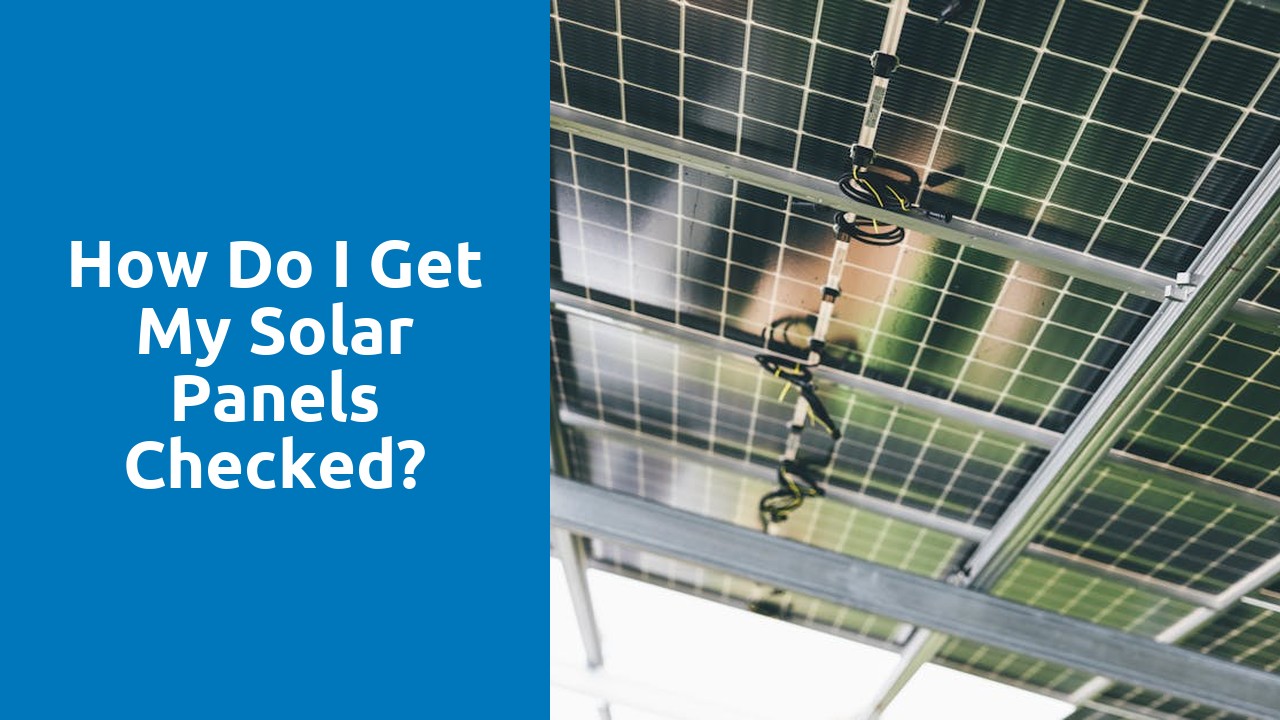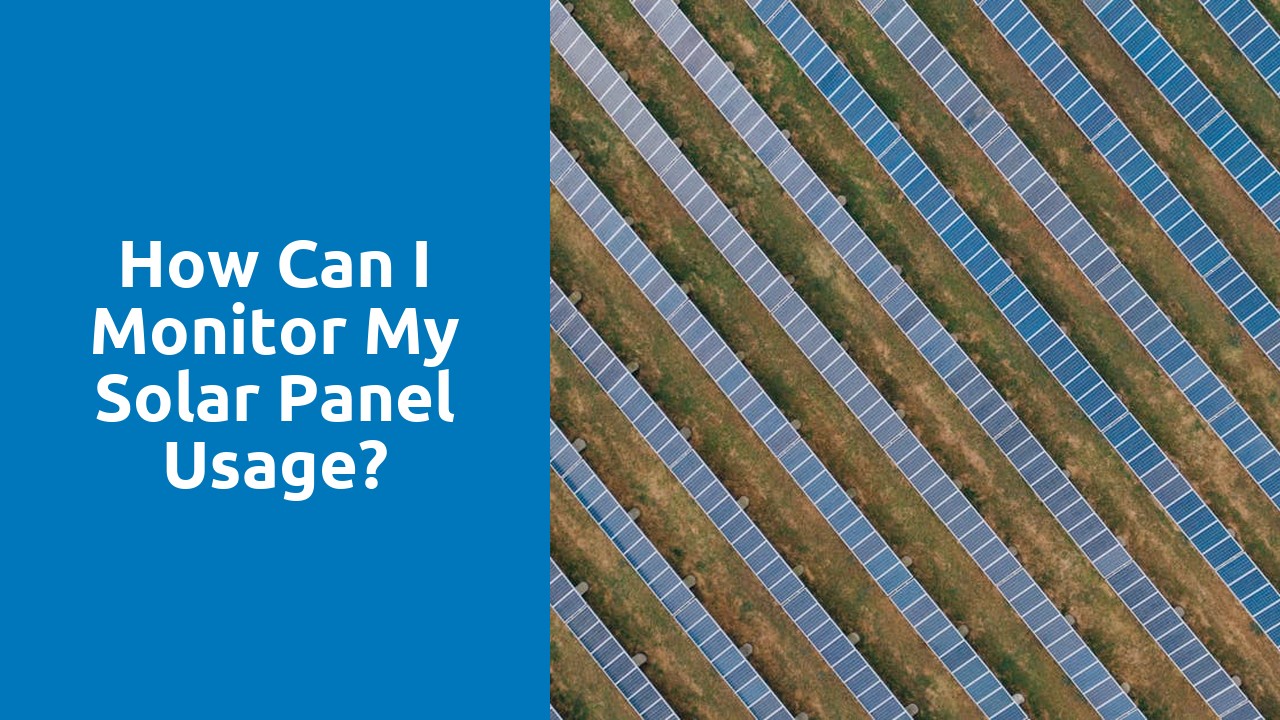
Understanding the Solar Panel Inspection Process
Understanding the Solar Panel Inspection Process
When it comes to ensuring the optimal performance and longevity of your solar energy system, regular inspections are crucial. Solar panels are exposed to various environmental elements over time, which can lead to wear and reduce efficiency. The inspection process involves a comprehensive assessment of the physical condition of the panels, checking for signs of damage such as cracks, discolouration, or corrosion.
In addition to examining the physical state of the panels, a thorough inspection also includes assessing the system performance metrics. This involves monitoring the energy production levels, checking for any fluctuations or irregularities in the output. By conducting these evaluations as part of the Solar Panel System Monitoring, technicians can identify potential issues early on and recommend the necessary maintenance or repairs to keep your system running optimally.
Checking for Physical Damage or Wear
Solar panel maintenance should always include a thorough check for physical damage and wear. Damage to solar panels can occur from a variety of sources including weather conditions, debris, or simply the passage of time. It is important to inspect the panels for any cracks, scratches, or other signs of wear that could compromise their efficiency. Since solar panels are constantly exposed to the elements, regular inspections are essential to ensure they continue to function optimally.
When examining your solar panels for physical damage or wear, pay close attention to the surface of the panels. Look for any visible signs of damage such as discolouration, warping, or corrosion. Also, inspect the frame and mounting systems for any rust or loose connections. Regular Solar Panel System Monitoring can help detect and address any issues early, preserving the longevity and efficiency of your solar panel system.
What to Expect During a Solar Panel Inspection
During a solar panel inspection, a qualified technician will first visually examine your panels to check for any signs of physical damage or wear. This includes looking for cracks, corrosion, or loose connections that could affect the efficiency of your system. They will also inspect the mounting system to ensure that it is secure and stable. Following this visual inspection, the technician will move on to assessing the system performance metrics. This involves using specialized equipment to measure the output of each individual panel and assess whether they are generating electricity efficiently. Solar panel system monitoring plays a crucial role in this step as it provides real-time data on the performance of your panels, allowing the technician to identify any issues that need to be addressed promptly.
Assessing System Performance Metrics
Solar panel performance can be evaluated through a process known as Solar Panel System Monitoring. This entails closely monitoring key metrics such as energy production levels, system uptime, and any deviations from expected output. By regularly assessing these performance metrics, homeowners can gain valuable insights into the efficiency and health of their solar panel system. It allows for early detection of any potential issues or inefficiencies, enabling timely maintenance or repairs to ensure optimal system operation.
Solar Panel System Monitoring plays a critical role in ensuring that solar panels are operating at peak performance levels. It provides real-time data on energy generation, allowing homeowners to track their system's output and efficiency. By routinely analysing these performance metrics, users can make data-driven decisions to maximise the benefits of their solar panel investment and ensure a sustainable renewable energy source for their home.
Frequency of Solar Panel Inspections
Regular solar panel inspections are essential to ensure your system continues to operate effectively and efficiently. It is recommended to conduct routine inspections at least once a year, ideally before the peak energy production periods. By scheduling regular maintenance checks, you can identify any potential issues early on and prevent any significant damage to your system. Implementing a proactive approach to solar panel system monitoring can help extend the lifespan of your panels and maximize their performance over time.
The frequency of solar panel inspections may vary depending on various factors such as environmental conditions, system age, and manufacturer recommendations. Additionally, if you notice any sudden drops in energy production or detect physical damage to your panels, it is crucial to conduct an immediate inspection. Setting up a regular maintenance schedule for your solar panel system can help address any issues promptly and ensure your system operates optimally year-round.
Setting Up a Regular Maintenance Schedule
Setting up a regular maintenance schedule for your solar panel system is crucial in ensuring its longevity and efficient operation. By implementing a consistent maintenance routine, you can identify any potential issues early on and address them promptly. As part of your maintenance schedule, it is recommended to conduct periodic checks on your solar panels to assess their functionality and performance over time.
Solar panel system monitoring is an essential aspect of maintaining the efficiency and productivity of your renewable energy system. By tracking the performance metrics of your solar panels regularly, you can stay informed about any deviations or inefficiencies that may arise. Incorporating system monitoring into your maintenance schedule will enable you to make informed decisions regarding the upkeep and optimization of your solar panel system.
FAQS
How often should I get my solar panels checked?
It is recommended to have your solar panels checked at least once a year to ensure optimal performance and identify any potential issues early on.
What are the common signs of physical damage or wear on solar panels?
Common signs of physical damage or wear on solar panels include cracks, discolouration, warping, or water ingress. If you notice any of these signs, it is important to get your panels checked promptly.
What can I expect during a solar panel inspection?
During a solar panel inspection, a qualified technician will visually inspect the panels for physical damage, check the wiring and connections, assess system performance metrics, and ensure that the panels are operating efficiently.
How can I assess the performance metrics of my solar panel system?
Performance metrics such as energy production, efficiency, and degradation rate can be assessed using monitoring software provided by your solar panel installer. This software can help track the performance of your system over time.
Is it important to set up a regular maintenance schedule for my solar panels?
Yes, setting up a regular maintenance schedule for your solar panels is crucial to ensure their longevity and efficiency. By scheduling regular inspections and maintenance, you can catch potential issues early and keep your system running smoothly.
